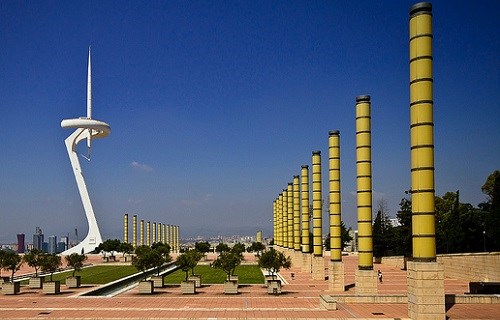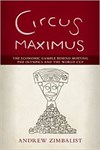Olympic spoilsport

The '92 Games in Barcelona are by many thought to be the most succesful Games in history. Photo: David Meenagh/Flickr
21.04.2015
By Andreas SelliaasSome books you wish you had read earlier, others you wish were written earlier. Circus Maximus should have been written earlier, at least before the Norwegian debate on applying for the 2022 Olympic Winter Games started. By fall 2014, the Norwegian government chose to scrap a Norwegian bid leaving the IOC with only two candidates: Almaty, Kazakhstan and Beijing, China.
Circus Maximus is written by the American economy professor Andrew Zimbalist. He is a well known American sports economist best known for analysing American sports and the economic impact of stadium development and sports events on American communities.
The main conclusion of his studies is that more money spent on sport means less money spent on other forms of entertainment. In his new book on the Olympics and the football World Cup, he strengthens this assertion.
Systematic analysis of existing research on mega-events
Andrew Zimbalist’s earlier studies of American sports economy led the entertainment industry in New York to engage him in an Olympic study in 2003, because New York wanted the Olympic Games in 2012, and because the entertainment industry feared that the Olympics in New York would make the theatre and entertainment industry along Broadway suffer. The result is Circus Maximus.
This book systematically analyses consultant reports and research papers on the Olympics and the World Cup in football, covering economic sustainability, employment, tourism, public health, environmental protection, etc. – knowledge that was absent from the Norwegian Olympic debate and has been missing in the run up to the World Cup in Brazil and the Olympics in Rio.
And Zimbalist’s conclusion is ruthless: do not use economic or development arguments to convince people to seek the hosting rights for the Olympics and the football World Cup. It never adds up, he claims.
Compilation of research
Through his analysis, Zimbalist argues that the Olympics and the football World Cup are not economically sustainable events no matter how you look at it. Not in the short term (perhaps with the exception of short-term employment) and not in the long term.
He contests consultant reports that, in their preliminary studies, highlight only the economic upside of Olympic projects based solely on wishful thinking and distorted facts, and not on analyses of the factual situation.
He also shows – and this is perhaps the most important part of the book – by comparing research in sports economics that it is almost impossible to find any positive economic long-term effects from the Olympics and the football World Cup.
The opponents against an Oslo 2022 bid won much support by using the cost argument in the Norwegian Olympic debate. The Olympics is expensive, way too expensive, was their claim.
This book underpins their argument, but had Circus Maximus been published earlier, perhaps those who wanted the Olympics to Norway could have accepted this argument and rather concentrated on different arguments in their campaign?
Why did Barcelona succeed?
Circus Maximus was completed before the IOC adopted its reform project ‘Agenda 2020’ in December last year, and some of Zimbalist’s arguments are marked by that. But still he presents valuable contributions to the debate on mega-events and what is needed for them to have a future outside dictatorships not caring much about costs and human rights.
He compares the Olympics in Barcelona in 1992 to the Olympics in Sochi in 2014 – the beauty and the beast among past Olympic hosts – to show what is wrong with the Olympics.
Zimbalist believes that Barcelona – which many consider the most successful Olympics in history – was a success because the city had already built and planned most of the venues before it decided to apply for the Olympics. The Olympics became an add-on to the urban planning, not a separate project without any legacy plan.
In Sochi, everything was built from scratch and in an area that is best known for summer tourism. This created corruption, led to construction of venues designed only for the Olympics and to a project which in the future might actually turn out to hurt summer tourism.
Poor versus rich?
By comparing the London Olympics in 2012 with the World Cup in Brazil in 2014 and the Olympics in Rio in 2016, Zimbalist tries to show that the level of development in the host country greatly affects whether a project gets out of control or not.
Although he argues that the London Olympics has failed to live up to almost every goal it set out before the Games, he clearly states that they had more control than the Brazilian authorities have had over their mega-events.
Necessary reforms of the IOC and FIFA
The professor makes a point of the fact that the IOC wanted to bring along a bid from Norway and Oslo in the 2022-process despite the fact that popular support was too low to satisfy the IOC's own demands for support (which is 60%). He thinks this signals that the IOC saw its own shortcomings and wrong direction, and that Norway could have helped the Olympic Movement back on track.
Zimbalist suggests two types of reforms of the Olympics and the football World Cup.
Firstly, reforms from above. Either by establishing new championships in direct competition with the Olympics and the football World Cup (this has been tried – unsuccessfully – several times before, but if competitions such as the X Games become even more popular it might make the IOC think differently about the Winter Olympics) or by allowing the IOC and FIFA to control the number of cities and countries bidding for the event. This is already in the Agenda 2020.
Secondly, reforms from below. Either by ensuring that bidders increasingly rely on venues that already exist or by ensuring that a greater share of the event is privately funded, as was the model in Los Angeles in 1984.
Basis for a new Olympic debate?
In the next edition of the book, Andrew Zimbalist will most likely include a new preface in which he specifically mentions Agenda 2020. Some of the suggestions he makes in his book have already been adopted in IOC’s reform project.
Although the book was too late to make a difference on the Norwegian Olympic debate, it is well-timed for the US Olympic debate. Boston is considering a bid for the Olympics in 2024 and has announced a referendum on whether to make the bid or not.
This book will surely influence the American debate before this vote.
More information
 Circus Maximus:
Circus Maximus: The Economic Gamble Behind Hosting the Olympics and the World Cup
By Andrew Zimbalist
175 pages.
Brookings Institution Press
This book reveiw first appeared on sporten.com (in Norwegian) and is republished on playthegame.org with kind permission from the author.





